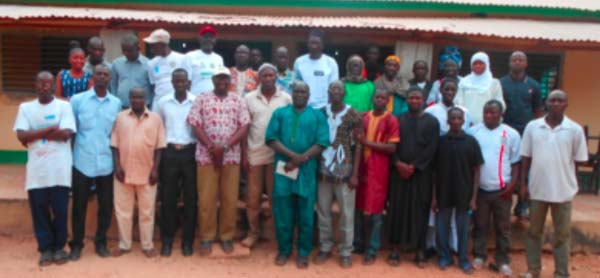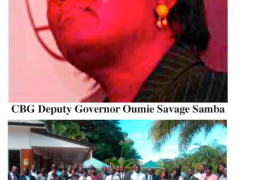
He noted that the transfer of knowledge to relevant stakeholders on sound environmental management guarantees a healthy environment for everyone.
He argued that it is everyone’s responsibility to protect, preserve and conserve the environment as it is the food-basket of our livelihood.
URR Governor Ceesay was speakingrecently at a day’s awareness training workshop for members of his technical advisory team, Farmers’ Platform and other relevant stakeholders in the region organized by the NEA held at the regional Agricultural Training Center in Basse.
Creating linkages built on common understanding through diverse communication methods including focus group discussions like this, and a holistic approach could improve and preserve the environment, Governor Ceesay went on.
Bridging the gap between policy-makers and technicians, Governor Ceesay revealed, the ANR policy is the umbrella strategy that supports The Gambia’s national plans, processes and actions for the attainment of sustainable development in agriculture and natural resources.
He said the policies focus on improved and sustainable measurable levels of food and nutrition security in the country and vulnerable populations, in particular.
Giving a brief background to the project, NEA’s programme officer for Agriculture and Natural Resources, Lamin Camara, said the NEA has signed a letter of agreement with the Forest and Farm Facility (FFF) organisation through the Food and Agricultural Organization (FAO) to implement small grant programmes to serve as a support to the Agriculture and Natural Resources (ANR) Platform of The Gambia
As part of the agreement, he said, key sectors of government institutions, regional technical advisory committees (TAC), NGOs and farmer-based organizations (FBO) in the regions should benefit from an awareness-raising programme on the relevant ANR sector policy, including the Biodiversity and Wildlife Policy, Fisheries Policy, Forest Policy and National Environment Management Act (NEMA) 1994.
He said the policy also catered for a strong and enabling environment to reducing vulnerability in food and nutrition security, and thereby creating a sustainable effective management of the natural resources base of the sector.
He further reiterated that this sector plays an important part in our development agenda, noting that since 1994, the chairman of the Gambia Environment Management Council (NEMC), President Yahya Jammeh, has been advocating for the massive development of the agricultural sector.
Camara further disclosed that the developmentof Agriculture and Natural Resource (ANR) sector is bound to make profound impacts on not only the lives of the habitants, but also help structure and protect the ecosystems - the fauna, flora and the water bodies.
The chairman of the training session, Sheikh Alkinky Sanyang, an environmental education and communication officer at the NEA, described the information cross-learning dialogue for regional technicians on agriculture and natural resources as a platform to discuss and share sector experiences, in an effort to catalyze multi-sectoral stakeholder policy platforms with governments at the local and regional levels.



